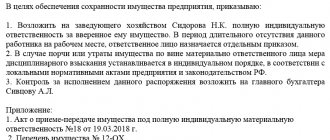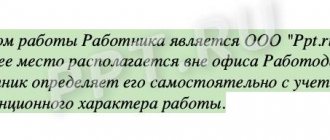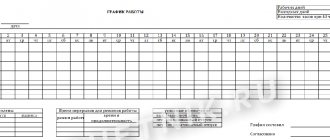When does liability arise?
According to Chapter 37 of the Labor Code of the Russian Federation, this happens if:
- one of the parties suffered damage as a result of the action or inaction of the other party;
- There are no legal reasons for exonerating the perpetrator from liability.
The injured party is obliged to provide evidence of the damage suffered and its magnitude.
Specific conditions for the occurrence of liability may be prescribed:
- in the text of the employment contract;
- in additional agreements thereto.
Important! The amount of financial liability reflected in the employment contract or agreements is related to the provisions of the Labor Code of the Russian Federation and federal laws: for the employer it cannot be lower than general federal standards, and for the employee it cannot exceed these standards.
Dismissal of an employee or termination of a contract does not relieve liability from either party if damage has already been caused.
Conditions of attack
- an unlawful act was committed, which resulted in property damage;
- the damage has actually been done;
- the transaction between the parties is properly formalized;
- the injured participant demands compensation for the loss he has suffered.
One constant is definitely guilt . That is, someone, with malicious intent or through negligence, did something that caused damage to someone else’s property.
Further, the employee committed mischief intentionally. Or without intent (although he was aware of the responsibility imputed to him, which he signed up for), he simply treated his duties carelessly - he did not take measures to prevent negative consequences, although he should have, did not foresee that they would come, or maybe he decided that “it will do.”
As is known from Roman law, whoever makes a claim has the burden of proof. So the employer must clearly establish the illegality of the act and that the latter is directly related to the damage suffered. To do this, an inventory, audit, audit or internal investigation is carried out.
Based on the results, a special form of act is drawn up . Then the offender will be asked to explain in writing what happened.
He compensates for the degree of his harm on his own initiative, or obeys the requirement from above. Or he doesn’t comply, and then the money will have to be recovered in court.
How to arrange this?
- additional agreement to the main employment document (full responsibility);
- a one-time power of attorney to receive valuables;
- clauses in the main agreement.
Liability, which was described by an ordinary agreement, can only be limited by Art. 242-243 TK ). This point refers to the section on additional conditions. The area for which the candidate is responsible is indicated and exactly how much, if anything, he will risk - no more than the average monthly salary.
In this case, it is impossible to attract a person “to the fullest.” Even if a paragraph of the document says otherwise, it is illegal.
The exception is the director of the company, his deputies and the chief accountant. These conditions of material obligations can be stipulated directly in the agreement (Article 243 of the Labor Code), without resorting to additional papers.
You will be surprised, but there is even liability for environmental violations. You may be interested in information about:
- who carries;
- what kind of contracts are there?
- what is a contract log?
- how the dismissal of the responsible person occurs;
- how much is the additional payment and how does the change of responsibility or appointment occur.
And if you have questions during inventory, here you can find the necessary information.
Employee Responsibility
Situations where an employee is responsible for damage caused to the employer arise quite often. They are discussed in detail in Chapter 39 of the Labor Code of the Russian Federation.
The administration can bring the culprit to justice if the following are identified:
- fact of damage;
- the fault of the employee who acted incorrectly or failed to act, resulting in damage;
- amount of damage.
In certain cases, an agreement on full financial liability is required. The employee’s liability is limited by default - its volume cannot be higher than the average monthly earnings (Article 241 of the Labor Code of the Russian Federation).
We can talk about full financial liability in strictly defined cases.
A minor employee under 18 years of age bears full financial responsibility for intentionally caused harm, harm caused while intoxicated (including if there was any toxic intoxication) and in a situation where the damage was the result of a misdemeanor or crime (Article 242 -3 Labor Code of the Russian Federation).
As a general rule, the list of cases of full financial liability is much wider. In addition to those listed above, in Art. 243 of the Labor Code of the Russian Federation indicates the following situations:
- by virtue of legislative norms, the employee is entrusted with full financial responsibility (certain professions with special working conditions, for example, a telecom operator, in accordance with Federal Law-126 of 07/07/03, Article 68);
- a shortage for which the employee is responsible under a contract or a one-time document;
- disclosure of secrets: state, official, commercial, if such a case is mentioned in federal legislation;
- damage to the employer was caused during non-working hours, usually in the presence of selfish interest on the part of the employee.
Full financial liability of the deputy manager and chief accountant may also occur under the specified article of the Labor Code. It occurs if it is mentioned in the employment contract. The head of the organization bears financial responsibility in full according to the provisions of Art. 277 Labor Code of the Russian Federation.
It is especially worth mentioning contracts of full financial liability that the administration can conclude with an employee or a team (Articles 244, 245 of the Labor Code of the Russian Federation). An individual contract is concluded, as a rule, along with an employment contract, if the hired citizen directly deals with material assets or money and is responsible for them due to his job responsibilities. Similarly, team, collective responsibility arises if it is impossible to identify and delimit the responsibility of each person when performing certain work.
The list of positions and standard contract forms are established by Resolution of the Ministry of Labor dated No. 85 12/31/02. The list is closed; adding other professions, positions and mentioning them in the LNA is illegal. Examples include the cashier, storekeeper, and workers raising young animals.
The legislator allows claiming only direct, real damage, which does not include lost commercial profits. Market prices are taken as a basis, but not less than the value of the property according to financial statements. The organization conducts an inspection of any identified case of improper handling of valuables, and creates a commission. The alleged culprit is required to provide a written explanation, which he is obliged to give. If there are no explanations, the commission will draw up an act recording this circumstance. In turn, the employee has the right to involve his representative in the proceedings (Article 247 of the Labor Code of the Russian Federation).
In some cases, the law establishes special rules for determining the amount of liability if there has been damage or theft. This applies to drugs, precious metals and stones. They are determined by the relevant Federal Laws.
The Labor Code of the Russian Federation names the circumstances under which it is impossible to hold an employee accountable (Article 239 of the Labor Code of the Russian Federation): force majeure (natural disaster), normal economic risk (the goal set for the employee cannot be achieved by other means), necessary defense or extreme necessity (the danger threatens oneself employee or others, for example, fire). He is released from liability in a situation where management has not created the conditions necessary for the safety of valuables, for example, the warehouse is not provided with reliable locks, and there is no security.
Concept in an employment contract and its types
If one of the signatories of the agreement harmed another, then he is obliged to compensate for the damage - to the extent required by law. Whoever is the victim, he is obliged to prove that he suffered losses and in exactly the same amount as he claims (Article 233 of the Labor Code). The obligation works both ways - that is, the employer is no exception.
The employee is obliged to fulfill the duties assigned to him and take care of the owner’s goods, and the boss, for his part, undertakes to give the hired person work, provide the proper conditions for its implementation and pay fairly.
In addition, you cannot demand less from a manager, and more from a subordinate, than labor legislation implies.
This responsibility is not limited to the official paper. Simply put, even if the contract is terminated (for example, a person was fired), you will still have to compensate for the damage (Article 232 of the Labor Code).
Financial liability is:
- full;
- partial;
- brigade (collective).
Full agreement is concluded only with persons of a certain category (Resolution of the Ministry of Labor of the Russian Federation No. 85) - those who are directly in charge of money and valuables. These are managers, directors, their deputies, warehouse managers, pharmacies, storekeepers, pharmacists, library keepers, salespeople, cashiers. This is not the entire list, but it cannot change.
Mandatory factors:
- a crime or administrative offense has occurred;
- the damage occurred as a result of specific actions of this particular employee;
- the respondent was drunk or under the influence of drugs;
- valuables entrusted with a personal signature disappeared;
- the employee caused the damage while not on duty;
- the damage was caused as a result of an employee’s excessive talkativeness, as a result of which non-disclosed information (for example, a trade secret) became the property of other people’s ears.
Partial (Article 241 of the Labor Code) is the most popular and its conditions are prescribed in the contract with the employee. It is measured by the average monthly salary of an employee.
Material liability of an employee under labor law and civil law
Despite the similarity in essence - in both cases a person harms the safety of someone else's property - there is still a difference between these concepts.
For example, who should be blamed for what ? In the case of material, only a person bound by a contract with a specific employer can be involved in it. In legislation, a person is always responsible for his own actions - and a minor too.
In property terms, parents may be required to compensate for damage caused by their young children. Further, labor law requires compensation only for direct actual damage. The same cannot be said about civilians, who very much allow you to reclaim lost profits.
It also matters how much it is realistic to take from the culprit.
Labor law will always be based not only on how ruined the owner is, but also on how much the idiot violator is able to pay.
In a civil court, you don’t care about your financial capabilities - it will be based on how much property was lost and under what conditions.







